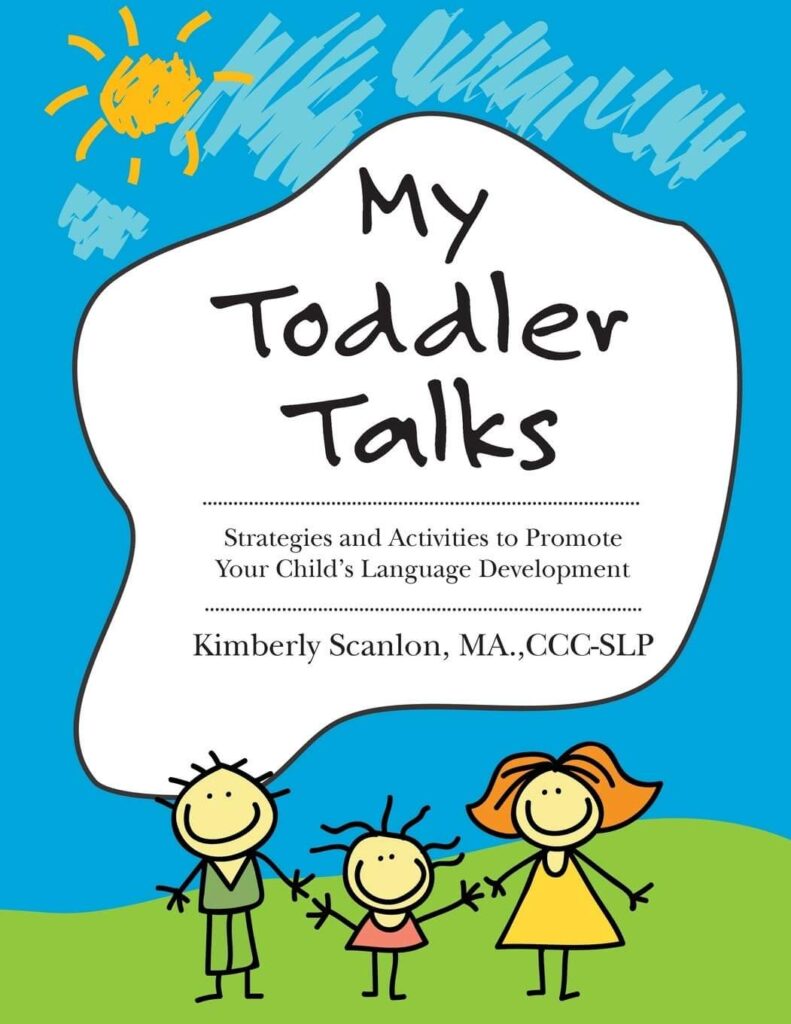Sneak peek: If it seems like your toddler speaks their own language, that might be the case (sort of). Research gives us insight into how toddlers learn language. Plus, when does the language explosion occur in toddlers?
You may have heard about something curious that happens among toddlers as they’re starting to talk. One day, they know just a few words and then there’s a big burst—a language explosion! But when does the language explosion occur, and what does it mean? It’s all part of the fascinating world of language development.
Another interesting thing toddlers do is that sometimes it seems like they speak their own language. They come up with silly phrases or funny derivations of words that they’ve heard adults say. It seems to be a common and entertaining aspect of toddler development. My own toddler did this a few years ago.
We had the habit of saying “Oh my gosh!” when something happened that excited us or surprised us.
After hearing this many times in our house, our two-year-old (at the time) got in the habit of saying, “Oh bo gah” instead of “Oh my gosh!”

He said it was such enthusiasm and spirit, just like he knew exactly what he was saying. Of course, in his mind, he did.
This just goes to show that imitation plays a huge role in how toddlers learn language. But how else do they learn language?
Do Toddlers Have Their Own Language?
A new study implies that your toddler speaks her own language (sort of). Toddlers, in fact, really do develop their own individual language and grammar rules.
The study looked at 2 and 3-year-olds and analyzed over 60 hours of conversation they had with their parents. I think most parents would not really find the results surprising. Instead of adhering to the rules of English, each toddler developed their own individualized “rules” for categorizing words into nouns and verbs, and had to put them together. In other words, the process of learning language seems to be, as the authors describe, “gradual and piecemeal.” This surprised some researchers who had previously thought that children had an innate understanding of verbs and nouns, at least in a general way. This new study shows that this may not be the case, but that toddlers just gradually figure out language as they are exposed to it.

The thing I find fascinating about this study is that each child develops their own system for understanding language. Probably some of you with multiple children have experienced this yourself. Maybe one of your children learned language in a different way than another. For example, I’ve heard kids start to add “ed” to the end of every word once they figured out that it often means past tense. So instead of “I stood next to him,” the child says, “I standed next to him.” Turns out, this is all part of each child’s own way of figuring out the rules of grammar. Interesting!
Do you think your child might be going through a growth spurt? Check out this toolkit to help you navigate this phase with confidence.
When does the language explosion occur in toddlers?
Along with this piecemeal and gradual approach through which toddlers learn language is another underlying factor: the language explosion. Many parents may wonder when the language explosion occurs. As with everything, each child follows their own unique path, but research suggests that it generally happens between 18 months and 2 years of age. Many of us have experienced this first-hand. Our 1-year-old may know how to say a few simple words like “bye,” “hi,” or “mom,” but then a few months later, it seems like they’re learning a new word every day. These new words are not just nouns that describe objects either, they are higher-level concepts like “wet,” “dry,” or “cold.”
Do we all have genius toddlers? Well, sort of….

Researchers believe that once toddlers master the “easy” first words, more difficult words come to them in a language explosion because there are significantly more difficult words than easy ones. Some statistical models show that toddlers can learn up to 10 new words per day!
One researcher explained it this way,
The key is the relative number of small jars to big jars (or easy words to difficult words)—as long as there are more difficult words than easy words, which is generally the case with languages, the vocabulary explosion will happen.
“Clearly, the specialized mechanisms aren’t necessary. Our general abilities can take us a lot farther than we thought.”
Related reading: Finding Meaning in the Mayhem: How to Spot (and Survive) a Toddler Growth Spurt
Toddler Language Delays and the Role of Temperament
These findings on the language explosion, of course, do not imply that variations are uncommon. Not all kids experience this stage or at the same rate. Language delays can happen for a variety of reasons. Learning language is a complex and multifaceted aspect of development. Of course, language delays in toddlers can result from physical or environmental factors. One factor that is often overlooked is temperament.

Consider this: if your toddler has a more inhibited temperament (i.e., shy) then they may be less likely to say new words or speak in general, especially to strangers. They may very well know many more words than they actually say but it is difficult for the average adult to determine that. This is where research can help us.
Several fascinating studies have looked at just this issue and found support for the idea that children with an inhibited temperament are less likely to test well on assessments of expressive language. The researchers considered several different explanations for the link. Simply put, they found the most evidence for the idea that children with an inhibited temperament most likely “know it but don’t say it.” In other words, they tend to test equally well on receptive language (hearing and understanding words) but are less likely to say words that they know. This means that temperament is a factor that needs to be considered, along with others, when investigating any language delays.
Sign up as a paid subscriber to my Substack newsletter (for less than a cup of coffee:) and get access to this resource: 2-Year-Old Speech Checklist. You’ll also gain access to the FULL library of printable resources for families!

(As always, talk to your pediatrician if you’re concerned about any aspect of your child’s development)
So, if you hear your toddler making up words or it feels like they’re speaking their own language, they very well might be (at least for now). Observe closely, and you’ll see the magic of language development right before your eyes.
Related Resources:




Leave a Reply